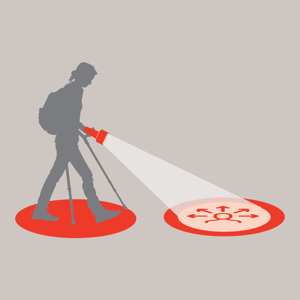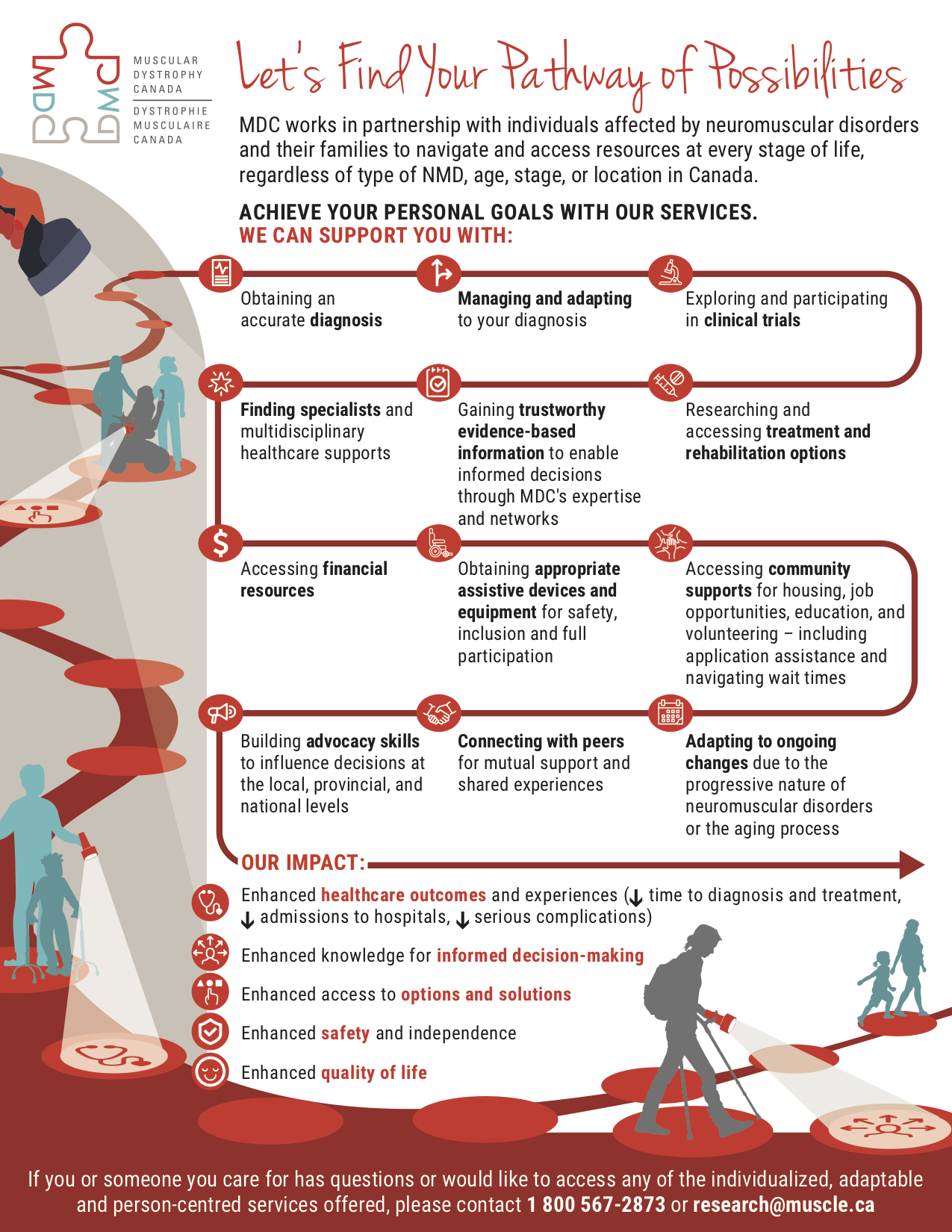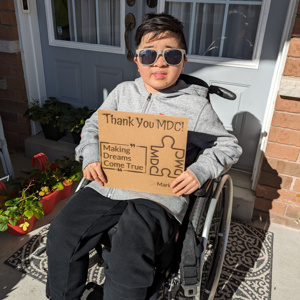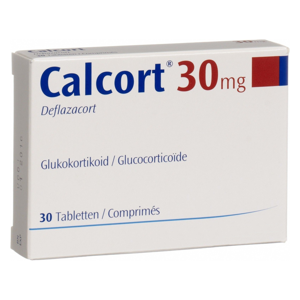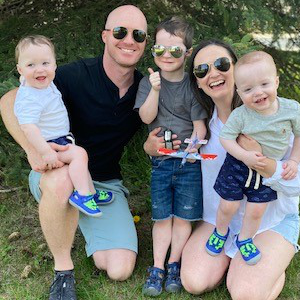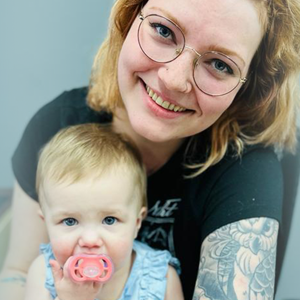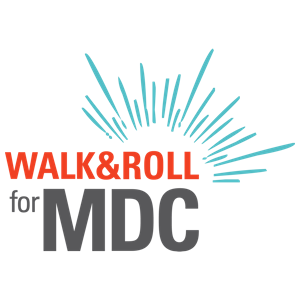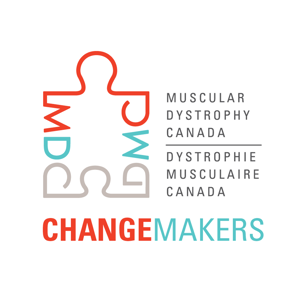Regardless of the NMD, MDC is here to help! The image below illustrates where along your journey MDC’s services will be able to support, guide and inform you and your families.
Mark got what he needed to get back outside and explore nature!
“My son is a 14 year old boy with DMD who was diagnosed when he was just one and half. Despite the physical limitations, Mark loves nature and outdoor time. But, we have to closely monitor the steps he takes so that he is not overexerting himself which will result in muscle cramps or even permanent damage. So sadly, we had to press pause on some outdoor activities until we could get him a manual wheelchair. It was not easy to find a good sized wheelchair for him to use safely outside. The health insurance only covers some portion of the cost for the customized chair we got for him. MDC reached out the helping hand as soon as they got to know about our needs and provided incredible support mentally, emotionally and financially. Thanks to MDC, our son can now go out and enjoy the fresh air of the forest with more mobility and independence. Life doesn’t have to be perfect to be wonderful. MDC’s life-changing support always comes at the perfect time and makes our lives better. We know there are so many heroes with capes working very hard to support us and other families in need.”
Community Statement: Update on Deflazacort®/Calcort® Availability
We want to bring your attention to recent developments surrounding the availability of Deflazacort®/Calcort®, a corticosteroid vital to many Canadians affected by Duchenne muscular dystrophy. Up until 2023, Deflazacort was accessible at a relatively low cost in Canada through Health Canada’s Special Access Program despite intermittent supply shortages. In February, due to a change in the manufacturer, the price of Deflazacort was increased by a staggering 400%. The price increase led to an initial disruption in supply and access but was fully resolved by spring.
In July, the Canadian distributor notified us about delays in the production of Deflazacort originating from issues at the manufacturer’s end. Despite our ongoing attempts to seek updates and influence change, the supply challenges persisted, directly impacting individuals with Duchenne and their families throughout Canada. The positive update is that we received communication last week from the manufacturer, Cheplapharm, indicating that the supply is set to be restored and will soon be accessible again in Canada. The supply of Deflazacort for Canada is undergoing quality control procedures in their warehouse and they have assured us that they will prioritize the delivery to expedite the availability of Deflazacort in Canada. If you are experiencing challenges accessing Deflazacort®/Calcort®, or your pharmacy has questions about this product, please contact us at research@muscle.ca or call 1-800-567-2873 ext. 1114.
We should note that in light of the recurring issues related to supply, stock shortages, and pricing, MDC is eager to collaborate with you, our valued community members, to navigate the optimal approach to addressing these changes. Together, we remain committed to advocating for improved access, affordability, and timely availability of essential medications and therapies for the neuromuscular community.
Thank you,

Chief Executive Officer
Muscular Dystrophy Canada
Your support has improved outcomes for thousands of Canadians, like Ben
“We thought our child was going to die a very slow and painful death. Our world ended, and we were never going back to life as we knew it.” Those were Amanda and Brodie’s first thoughts when they learned their son, Ben, was affected by Duchenne muscular dystrophy (DMD).
For the first three years of Ben’s life, countless doctors and physiotherapists told his parents that he suffered from low muscle tone. Unable to crawl, or walk unassisted, Ben was referred for blood tests. “When the doctor told me he had muscular dystrophy, she sent me information that told me I should expect my son to be in a wheelchair by age six, on a ventilator by age eight and dead by 19,” Amanda says. “It was horrific, devastating news.”
When a Canadian is diagnosed with a neuromuscular disorder, Muscular Dystrophy Canada (MDC) knows they will need a lot of support and have many questions. Your gift today will give families hope. When you’re facing a life-changing diagnosis for your child or family member, hope can make a huge difference.
Since our inception, MDC has been a leader in funding ground-breaking research for all neuromuscular disorders. For decades, MDC has been helping to accelerate the development of more treatments, therapies, and hopefully, one day soon, potential cures. It is an exciting time for neuromuscular research and we are proud to see incredible advancements that are having real-world impacts on families like Amanda and Brodie’s.
After the initial shock of Ben’s diagnosis wore off, and Amanda and Brodie were able to digest the information they had received, they were referred to MDC by their healthcare provider. Armed with new information about therapies and medication available, Brodie and Amanda started to have hope once again. “I remember feeling that finally there was a light at the end of the tunnel”.

By donating today, you are investing in families like Brodie and Amanda’s. Whether through research investments or helping them navigate upcoming treatments for Ben, your gift can enable so much. Thanks to you and others like you, we can continue to invest in Canadians affected by neuromuscular disorders in the ways that matter most to them.
“The funding that MDC has provided to neuromuscular research has changed our lives infinitely,” Brodie says. “We have seen directly, even from the information we received initially, how far medicine and therapies have come in as little as 10 years. Ben has great doctors who are pushing the envelope to find the next thing – a treatment, therapy or cure. The funding from MDC specifically enables them to do that research and take those chances.”
Being diagnosed with a neuromuscular disorder is very difficult and often shocking. Your mind races between practical concerns and anxious thoughts: what treatments are available? What will happen to me in the next five or 10 years? Who can give me the answers I can trust? By donating to MDC today, you are ensuring families have the answers they desperately require, ensuring hope in the months and years to come. You can help provide clarity and comfort to a family during that difficult time.
Thanks to improvements in neuromuscular treatments and therapies, today, Ben is an active six-year-old who is able to walk, run and climb. And while Amanda and Brodie are still concerned with what the future holds, they know that Duchenne is a very different disease now, compared to 20 years ago. “Ben has a very serious disease and kids still die from it, but Duchenne is not the disease it used to be. DMD comes in all shapes and sizes, which is thanks, in large part, to how far medicine has come. It is a heavy load to carry, but it would be a lot heavier without the support of MDC.”
Your generosity today will help support MDC’s programs and services, while also investing in critical neuromuscular research. Together, we can provide hope, change the face of muscular dystrophy and other neuromuscular disorders, and improve the outcomes now and for future generations. But we cannot continue this important work without your support.
“Understanding the support that MDC provides to Canadians is huge,” Brodie says. “There is a group of people – the MDC village, that are working day and night on behalf of my family. It affects our day-to-day life and I only see some of it – there is so much work happening beyond the support they provide to our family.”
Please consider making a gift today that will help countless Canadians right now. You can change the future and give hope to future generations.
Quebec joins the ranks of provinces screening newborns for life-threatening disorder
FOR IMMEDIATE RELEASE – Muscular Dystrophy Canada (MDC) is thrilled to announce that spinal muscular atrophy (SMA) has been added to the newborn screening panel in Quebec. A significant milestone for the province and MDC.
“Congratulations to the Government of Quebec on this step, which will lead to early diagnosis and treatments that will have life-changing results for individuals and families,” said Stacey Lintern, CEO, Muscular Dystrophy Canada.
Screening is being integrated now, with full implementation to take place by the end of 2023.
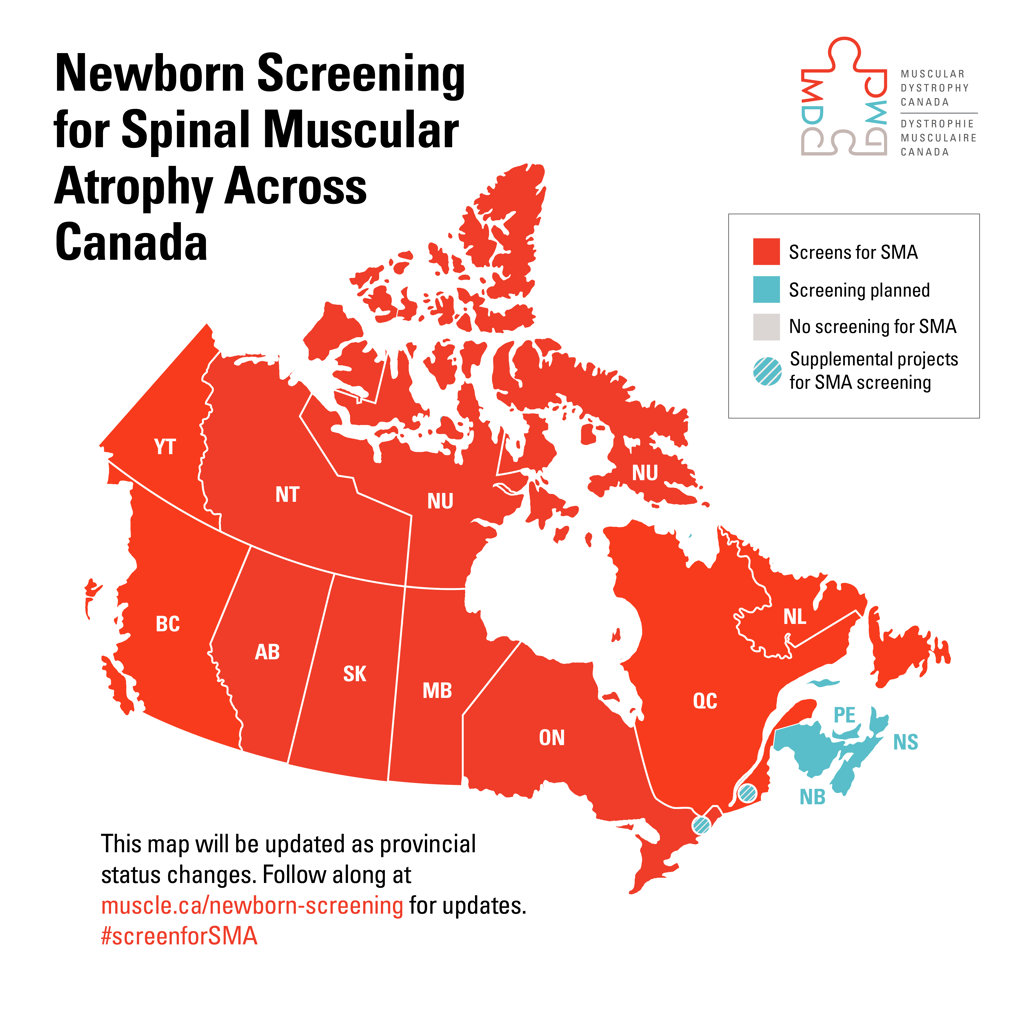
Over the past two years, MDC collaborated with Novartis Pharmaceuticals Canada Inc. as well as clinicians, researchers, people affected by SMA and families, Fire Fighters and donors to advocate for the inclusion of SMA on the newborn screening panel.
Extensive conversations, collaboration and financial contributions ($583,778) towards the lab program at CHU de Québec-Université Laval, equipment, and building an evidence-based pathway for the rapid early initiation of disease-modifying therapy for individuals with SMA across Quebec, led to this exciting change in policy.
“It was important for MDC to go beyond supporting the necessary infrastructure for SMA newborn screening, and to also ensure families receive the best quality care in the event of a positive screening result,” added Lintern. “We couldn’t be happier with the recent news. The addition of SMA to the panel means that infants and families in Quebec will now equitably benefit from the same opportunities as the majority of other Canadians, gaining access to early detection possibly before the onset of symptoms.”
MDC is currently working with Maritime provinces to begin the implementation of newborn screening for SMA. For more information on MDC’s efforts in ensuring all Canadian babies are screened for SMA, visit muscle.ca/services-support/newborn-screening/.
– 30 –
For more information, contact:
Sylvie St-AmandTranslation and Communication Specialist
Muscular Dystrophy Canada
Phone: 514-244-0381
Email: sylvie.st-amand@muscle.ca
Freya’s life has been changed, thanks to your amazing support
For many, the birth of a child is an exciting, and joyful event. Freya’s birth was no exception. Born last year, Freya was small, beautiful, and one of the first babies to be screened for spinal muscular atrophy (SMA) in Alberta.
In 2020, MDC began work to positively influence policy change, and get SMA included on all existing provincial newborn screening panels across the country. We’re nearly there, as today more than 75% of regions across Canada are offering this life-changing test. This is a huge step towards securing early diagnosis and access to treatment for the next generation of Canadians.
By making a gift today, you can help ensure Canadians of all ages have access to early diagnosis and treatment options.
“When Freya was a few days old, we were called in to get confirmation testing done on her, and her SMA diagnosis was confirmed when she was just two weeks old,” says Taylor, Freya’s mom. “The whole process was quite simple and quick. Once diagnosed, Freya was quickly approved for treatment which she received at 29 days old.”
One in 10,000 babies are born with SMA each year in Canada. Without early diagnosis and access to treatment, many infants will not live past the age of two. Thanks to your gifts, we are close to ensuring all babies across the country, like Freya, are screened and receive treatments that have life-changing results.
Today, Freya is an active toddler, exhibiting no signs of SMA. She is walking, running, climbing and talking like any other child her age.
Your gift today will enable MDC to continue advocating for improved diagnosis and treatment options, ensuring that all Canadians affected by a neuromuscular disorder, regardless of type, have access to the support and treatments that are right for them. Donate today to make a life-changing impact.
“Freya is a happy and healthy child, and I could not imagine what our life would look like if she were not given genetic, SMA-testing at birth,” Taylor says. “The challenges Freya and our family face because of her disorder are very minimal, thanks to early diagnosis and treatment. And while we have had many questions since her diagnosis, the support and information we have received from Freya’s doctors and MDC have helped us tremendously.”
Imagine how you would feel if you found out that your child was born with a degenerative, incurable disorder that would affect their quality of life. Now, imagine that they never received that diagnosis, delaying their access to life-changing treatment by years.
When you donate to MDC, you can help influence leaders to address gaps in our healthcare system, giving people living affected by a neuromuscular disorder a voice and improving their quality of life.
“The work that MDC put into advocating for SMA newborn screening is so important to so many families, and the only reason my family’s life is the way it is today,” Taylor says. “Many families do not have knowledge of the diagnosis or don’t know what they will need in order to give their children the best options in life. I cannot express the amount of appreciation I have for the work MDC put into getting SMA included in newborn testing!”
MDC is working hard to bring positive change to our community and to support the next generation of Canadians. But we need your help.
It takes just one generous act to change our country – and our future – for good.
Abilities (at the) Centre of new location for Walk and Roll for Muscular Dystrophy Canada
FOR IMMEDIATE RELEASE June 16, 2023
Toronto, Ontario – The 2023 Walk and Roll for Muscular Dystrophy Canada (MDC) has changed venues from a local park to the Abilities Centre in Whitby in an effort to ensure the event is as accessible as possible for all participants. It takes place on June 25, 2023.
“MDC is committed to breaking down barriers for the neuromuscular community. When we determined that the park location originally selected to host the Durham Walk and Roll for Muscular Dystrophy Canada posed accessibility issues for individuals using mobility devices, we set out to find a new site,” said Stacey Lintern, CEO, Muscular Dystrophy Canada. “We couldn’t be happier to be partnering with the Abilities Centre. It is the perfect space for the Walk and Roll event, and our community.”
Walk and Roll for Muscular Dystrophy Canada is MDC’s signature fundraising event, raising funds to provide Canadians affected by neuromuscular disorders support programs and services, invest in ground-breaking research and advocate for better public policies. Thirty-three events are taking place across Canada with an overall goal of raising $1.3 million.
The Abilities Centre strives to make communities more accessible and inclusive to increase the quality of life for every individual and enable them to participate fully in community life. They offer a wide range of programs and services, and lead research and advocacy on inclusion issues.
“Events like the Durham Walk and Roll for Muscular Dystrophy Canada are so important to bring attention to, and raise funds for, the organizations that are working tirelessly to make the communities where we live, work, and play more accessible and inclusive,” said Ross Ste-Croix, General Manager & COO of Abilities Centre.
Previously known as the Walk for Muscular Dystrophy, the nationwide fundraising event also underwent a name change this year to be more inclusive and reflective of the neuromuscular community. Anyone interested in participating in the Durham Walk and Roll for Muscular Dystrophy Canada can register at walkrollmdc.ca
The Durham Walk and Roll for MDC fundraising goal for 2023 is $53,000. Support your community by making a donation here.
-30-
ABOUT MUSCULAR DYSTROPHY CANADA
Muscular Dystrophy Canada’s mission is to enhance the lives of those affected with neuromuscular disorders by continually working to provide ongoing support and resources while relentlessly searching for a cure through well-funded research. To learn more about Muscular Dystrophy Canada, please explore our website or call our toll-free number at 1-800-567-2873.
ABOUT ABILITIES CENTRE
Abilities Centre exists to unlock potential through accessibility. Whether through vocational services, therapeutic recreation, adult day programs, or sport and recreation, every program and service at Abilities Centre is aimed at re-imaging how Canadians live, work and play. We continue to focus our impact to build towards an inclusive, barrier-free life for all Canadians. For more information abilitiescentre.org
FOR MORE INFORMATION CONTACT:
Heather RiceHeather.Rice@muscle.ca
902-440-3714
BREAKING DOWN BARRIERS FOR THE NEUROMUSCULAR COMMUNITY
Muscular Dystrophy Canada’s (MDC) strategic priorities represent a continuing evolution for our organization. They build upon the outcomes and learnings over the last three years, during which time our organization continued to meet the needs of clients through our programs and services, equipment, and system navigation; successfully encouraged governments to change public policy; and, supported translational and clinical research, in addition to, expanding Canadian neuromuscular research infrastructure.
Our investments in research have helped create exciting changes in the Canadian landscape. Whether it was working with our researchers and clinicians facilitating educational webinars, developing resources so our clients have access to credible and clear information, or through our shared work with the Neuromuscular Disease Network for Canada (NMD4C) – our clients are benefiting from early screening and diagnosing, new treatments, trials, and standards of care.
Extending into the next five years, our unwavering focus is on expanding our base of clients to ensure we assist more Canadians with neuromuscular disorders and their families. As well, we remain committed to fiscally responsible spending – ensuring funds raised go to our organization’s mission, and to increasing our fundraising activity to meet the needs of the neuromuscular community.
In addition to our commitment to reach more Canadians affected by a neuromuscular disorder over the next five years, the strategic priorities enable our commitment to ensuring we are innovative, efficient, and inclusive by providing our community the support and information they need to make informed decisions. We will expand our programs and services to engage further with remote and underserved communities, and will provide services in the languages that make up the fabric of our country.
Government policies at the federal, provincial, territorial, and local levels have a daily impact on our community. The next five years will see MDC expand our direct advocacy efforts working in partnership with our community, other like-minded organizations, industry, partners, clients, and government.
Over the next five years we will continue to work with researchers and clinicians to enhance collaborative and proactive strategies to support infrastructure development, capacity building, develop centres of excellence and the sharing of research outcomes that benefit our community.
We will respect that as a diverse community representing a wide spectrum of cultures and experiences, there are different ways of knowing, and of approaching health. We will incorporate this understanding and a respect for the whole person – mind, body, and spirit — in all that we do. We will continue to ensure that all organizational planning and decisions align with our strategic priorities, in addition to ensuring the right measurements are in place to monitor our performance.
Finally, we will not give up the search for more and better ways to work with all our stakeholders. Our clients and their families, staff, donors, supporters, partners, and volunteers are essential members of our community and we are grateful for their support every day.
We are excited about the impact MDC will have during the next five years.
VALUE OF A MONTHLY GIFT
VALUE OF A MONTHLY GIFT
Did you know that every month, you have the opportunity to change the life of someone affected by a neuromuscular disorder?
Making a monthly donation, and becoming an MDC Changemaker is an important and rewarding way to show your support for the neuromuscular disorder community. By pledging a few dollars each month, you can provide ongoing and meaningful support, which makes a huge difference in the lives the persons affected. MDC Changemakers are part of the fabric of the neuromuscular community and their support plays a vital role in driving our work forward and ensuring that Canadians affected by neuromuscular disorders have the tools and resources they need to live rich, full lives.
“Over the years, as my equipment needs have changed, Muscular Dystrophy Canada’s (MDC) support has been indispensable. With the support of donors, MDC helped me get an elevating wheelchair and even provided funding support so my family could afford a van with a power lift. And getting back some independence through this equipment has been life-changing for me. MDC made that possible.”
Alex Harold
- It’s convenient: Set it and forget it!
Monthly giving is a great way to include charitable donations in your budget. Smaller donations that occur throughout the year, are generally more manageable for your personal budget. Plus, MDC issues a single, consolidated tax-receipt to all Changemakers for the full amount of their yearly donation so you don’t have to keep track of each individual gift. - Compounded impact: A little goes a long way!
A regular gift made over a longer period of time stacks up in terms of total impact. Recurring monthly gifts provide MDC with regular and predictable support that allows us to fund our life-changing programming throughout the year and better predict future cash flows. - Join an exclusive community
At MDC, our monthly donors are Changemakers; a community dedicated to breaking down barriers for the neuromuscular community. Becoming an MDC Changemaker comes with some exclusive benefits, including: - A dedicated MDC staff member to answer your questions and provide support whenever you need it;
- Members-only webinars, focused on research updates;
- Email-only quarterly updates to share impact statistics and good news stories;
- An annual report highlighting how your support of MDC has impacted the neuromuscular community;
- The feeling of pride at being a part of one of the most important communities within MDC.
Become an MDC CHANGEMAKER today, and help break down barriers for people affected by neuromuscular disorders.
GETTING A CLOSER LOOK AT THE SOCIAL AND ECONOMIC COSTS OF NEUROMUSCULAR DISORDERS
Muscular Dystrophy Canada is proud of our significant contributions to understanding the costs related to living with a neuromuscular disorder (NMD) in Canada. In fact, thanks to your support, we led the first study to examine the societal cost in Canada for six common types of neuromuscular disorders: Duchenne muscular dystrophy, spinal muscular atrophy, myotonic dystrophy, facioscapulohumeral muscular dystrophy, Charcot-Marie-Tooth disease, and myasthenia gravis.
What we learned is although neuromuscular disorders are rare, the total number of people with one of the six disorders mentioned above is considerable, and the total annual cost to society is substantial ($4.6 billion). It also left us wondering, what are the indirect costs for individuals affected and their families: how much time is spent in clinics and hospitals, away from work and school, and how much time and money is spent on travel, medications, rehabilitation, assistive devices and equipment, diagnostics, home therapies and other aspects of life with an NMD.
BIND, is a comprehensive new study funded by CIHR and led by Dr Jodi Warman-Chardon from the University of Ottawa, which will collect information about the hidden and indirect costs of living with any neuromuscular disorder, at any age.
Watch now: Dr Jodi Warman- Chardon leads BIND study:
With new treatments and therapies becoming available in the near future, the BIND study will be leveraged to make informed decisions to influence public policies and healthcare system planning, as well as to shape Muscular Dystrophy Canada’s programming, inform our advocacy work, and help provide information to decision-makers about what families affected by neuromuscular disorders need most.
MDC is also calling on people with myasthenia gravis (MG) to help us map the Patient Journey: What were the first signs and symptoms of MG? How long did it take to get a diagnosis? How is MG managed today?
To participate in BIND or Myasthenia Gravis: The Patient Journey in Canada, please email research@muscle.ca or call 1-800-567-2873 ext. 1114.

